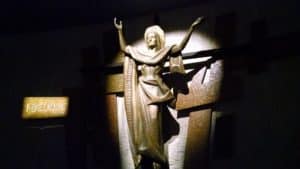Beatified by Pope John Paul II in 1993, Franciscan Sisters of Christian Charity highlight Duns Scotus on the November Franciscan Calendar. Scotus’s philosophical mind had considerable influence on these two points of Catholic thought.
Immaculate Conception
Scotus, the Doctor Subtilis (Subtle Doctor), devised the following argument: Mary was in need of redemption like all of us, but through the merits of Jesus’ death on the cross, given in advance, she was conceived without the stain of original sin. God could have brought it about in different ways. However he did it, it would be accredited to Mary.
Scotus’s defense appears in Pope Pius IX’s 1854 declaration of the dogma of the Immaculate Conception. It read: “at the first moment of Her conception, Mary was preserved free from the stain of original sin, in view of the merits of Jesus Christ.” The Subtle Doctor’s position was welcomed as “a correct expression of the faith of the Apostles.”
Feast of Christ the King
Nearing the feast of Christ the King at the end of the month, Scotus’ doctrine on the universal primacy of Christ became the primary reasoning for the feast of Christ the King. This feast was begun in 1925. Father Gemelli writes: “Duns Scotus conceived the universe in the form of a gigantic pyramid, built up of every kind of genera and species, rising upward by degrees, the lower stages united in their most noble part to the higher. . .’ Jesus Christ is the culminating logical point of creation.'” Thus, the Second Person of the Blessed Trinity would have assumed a human nature even if Adam had not sinned. Because Adam sinned Christ came as Redeemer of the human race, but He is at the same time King of creation.




